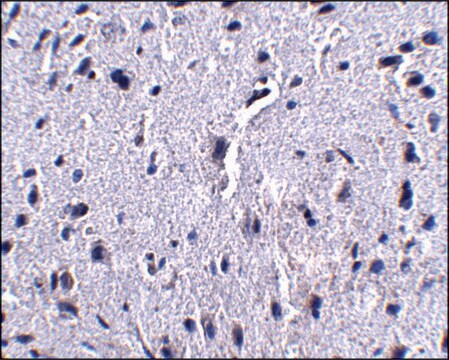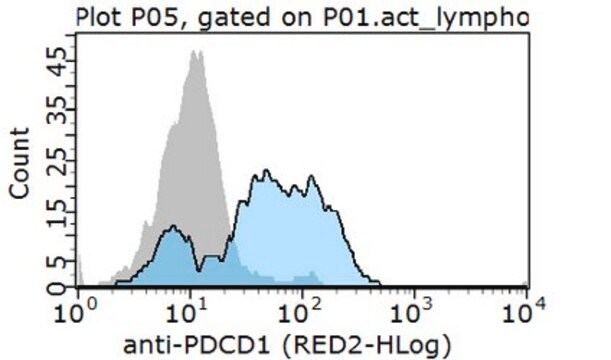ZRB1025
Anti-PD-1 Antibody, clone 1F7 ZooMAb® Rabbit Monoclonal

recombinant, expressed in HEK 293 cells
About This Item
Empfohlene Produkte
Biologische Quelle
rabbit
Qualitätsniveau
Rekombinant
expressed in HEK 293 cells
Konjugat
unconjugated
Antikörperform
purified antibody
Antikörper-Produkttyp
primary antibodies
Klon
1F7, recombinant monoclonal
monoclonal
Produktlinie
ZooMAb® learn more
Form
lyophilized
Mol-Gew.
calculated mol wt ~31.65 kDa
Speziesreaktivität
human
Verpackung
antibody small pack of 25 μL
Grünere Alternativprodukt-Eigenschaften
Waste Prevention
Designing Safer Chemicals
Design for Energy Efficiency
Learn more about the Principles of Green Chemistry.
Erweiterte Validierung
recombinant expression
Learn more about Antibody Enhanced Validation
sustainability
Greener Alternative Product
Methode(n)
affinity binding assay: suitable
flow cytometry: suitable
immunocytochemistry: suitable
immunohistochemistry (formalin-fixed, paraffin-embedded sections): suitable
Isotyp
IgG
UniProt-Hinterlegungsnummer
Grünere Alternativprodukt-Kategorie
, Aligned
Versandbedingung
ambient
Lagertemp.
2-8°C
Posttranslationale Modifikation Target
unmodified
Allgemeine Beschreibung
Each ZooMAb antibody is manufactured using our proprietary recombinant expression system, purified to homogeneity, and precisely dispensed to produce robust and highly reproducible lot-to-lot consistency. Only top-performing clones are released for use by researchers. Each antibody is validated for high specificity and affinity across multiple applications, including its most commonly used application. ZooMAb antibodies are reliably available and ready to ship when you need them.
Spezifität
Immunogen
Anwendung
Evaluated by Flow Cytometry in Molt4 cells.
Flow Cytometry Analysis: 0.1 μg of this antibody detected PD-1 in 250,000 Molt4 cells.
Tested Applications
Affinity Binding Assay: A representative lot of this antibody bound recombinant PD-1 fragment with a KD of 1.7 x 10-7 in an affinity binding assay.
Immunohistochemistry (Paraffin) Analysis: A 1:1,000 dilution from a representative lot detected PD-1 in human tonsil tissue sections.
Immunocytochemistry Analysis: A 1:100 dilution from a representative lot detected PD-1 in HuT 78 cells.
Note: Actual optimal working dilutions must be determined by end user as specimens, and experimental conditions may vary with the end user
Zielbeschreibung
Physikalische Form
Rekonstituierung
Lagerung und Haltbarkeit
Rechtliche Hinweise
Haftungsausschluss
Not finding the right product?
Try our Produkt-Auswahlhilfe.
Lagerklassenschlüssel
11 - Combustible Solids
WGK
WGK 1
Flammpunkt (°F)
Not applicable
Flammpunkt (°C)
Not applicable
Analysenzertifikate (COA)
Suchen Sie nach Analysenzertifikate (COA), indem Sie die Lot-/Chargennummer des Produkts eingeben. Lot- und Chargennummern sind auf dem Produktetikett hinter den Wörtern ‘Lot’ oder ‘Batch’ (Lot oder Charge) zu finden.
Besitzen Sie dieses Produkt bereits?
In der Dokumentenbibliothek finden Sie die Dokumentation zu den Produkten, die Sie kürzlich erworben haben.
Artikel
Learn about the hallmarks of cancer and find reliable ZooMAb® recombinant antibodies to study them, conveniently organized by cancer hallmark.
Unser Team von Wissenschaftlern verfügt über Erfahrung in allen Forschungsbereichen einschließlich Life Science, Materialwissenschaften, chemischer Synthese, Chromatographie, Analytik und vielen mehr..
Setzen Sie sich mit dem technischen Dienst in Verbindung.








